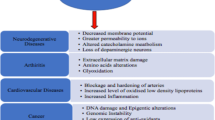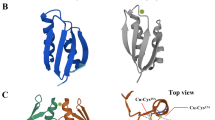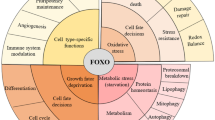Abstract
Superoxide dismutase 3 (SOD3) is a type of antioxidant enzyme, which plays an important role in converting superoxide anion into hydrogen peroxide through its extracellular activity. This enzyme has been widely studied and evaluated from various points of view, including maintaining cellular redox balance, protecting against oxidative damage, and enhancing overall cellular resilience. The current paper focuses on SOD3 expression from a functional perspective. In addition to a detailed examination of the gene and protein structure, we found ample evidence indicating that the expression level of SOD3 undergoes alterations in response to various transcription factors, signaling pathways, and diverse conditions. These fluctuations, by disrupting the homeostasis of SOD3, can serve as crucial indicators of the onset or exacerbation of specific diseases. In this regard, significant efforts have been dedicated in recent years to the treatment of diseases through the regulation of SOD3 expression. The ultimate goal of this review is to extensively highlight and demonstrate the immense potential of SOD3 as a therapeutic target, emphasizing its profound impact on health outcomes.

Similar content being viewed by others
Data availability
No datasets were generated or analysed during the current study.
References
İnal ME, Kanbak G, Sunal E (2001) Antioxidant enzyme activities and malondialdehyde levels related to aging. Clin Chim Acta 305(1–2):75–80. https://doi.org/10.1016/S0009-8981(00)00422-8
Wang Y, Branicky R, Noë A, Hekimi S (2018) Superoxide dismutases: dual roles in controlling ROS damage and regulating ROS signaling. J Cell Biol 217(6):1915–1928. https://doi.org/10.1083/jcb.201708007
Islam MN et al (2022) Superoxide dismutase: an updated review on its health benefits and industrial applications. Crit Rev Food Sci Nutr 62(26):7282–7300. https://doi.org/10.1080/10408398.2021.1913400
Eleutherio ECA, Magalhães RSS, de Araújo Brasil A, Neto JRM, de Holanda Paranhos L (2021) SOD1, more than just an antioxidant. Arch Biochem Biophys 697:108701. https://doi.org/10.1016/j.abb.2020.108701
Lewandowski Ł, Kepinska M, Milnerowicz H (2020) Alterations in concentration/activity of superoxide dismutases in context of obesity and selected single nucleotide polymorphisms in genes: SOD1, SOD2, SOD3. Int J Mol Sci 21(14):5069. https://doi.org/10.3390/ijms21145069
Rosa AC, Corsi D, Cavi N, Bruni N, Dosio F (2021) Superoxide dismutase administration: a review of proposed human uses. Molecules 26(7):1844. https://doi.org/10.3390/molecules26071844
Miao L, Clair DKS (2009) Regulation of superoxide dismutase genes: implications in disease. Free Radic Biol Med 47(4):344–356. https://doi.org/10.1016/j.freeradbiomed.2009.05.018
Sah SK, Agrahari G, Kim TY (2020) Insights into superoxide dismutase 3 in regulating biological and functional properties of mesenchymal stem cells. Cell Biosci 10(1):1–12. https://doi.org/10.1186/s13578-020-00386-3
Tak LJ et al (2021) Superoxide dismutase 3-transduced mesenchymal stem cells preserve epithelial tight junction barrier in murine colitis and attenuate inflammatory damage in epithelial organoids. Int J Mol Sci 22(12):6431. https://doi.org/10.3390/ijms22126431
Yang JW et al (2020) Extracellular vesicles from sod3-transduced stem cells exhibit improved immunomodulatory abilities in the murine dermatitis model. Antioxidants 9(11):1165. https://doi.org/10.3390/antiox9111165
Castellone MD et al (2014) Extracellular superoxide dismutase induces mouse embryonic fibroblast proliferative burst, growth arrest, immortalization, and consequent in vivo tumorigenesis. Antioxid Redox Signal 21(10):1460–1474. https://doi.org/10.1089/ars.2013.5475
Parascandolo A, Laukkanen MO (2021) SOD3 is a non-mutagenic growth regulator affecting cell migration and proliferation signal transduction. Antioxidants 10(5):635. https://doi.org/10.3390/antiox10050635
Kleniewska P, Hoffmann A, Pniewska E, Pawliczak R (2016) The influence of probiotic Lactobacillus casei in combination with prebiotic inulin on the antioxidant capacity of human plasma. Oxid Med Cell Longev 2016. https://doi.org/10.1155/2016/1340903
Jung O, Marklund SL, Xia N, Busse R, Brandes RP (2007) Inactivation of extracellular superoxide dismutase contributes to the development of high-volume hypertension. Arterioscler Thromb Vasc Biol 27(3):470–477. https://doi.org/10.1161/01.ATV.0000254823.15843.1f
Laatikainen LE, Incoronato M, Castellone MD, Laurila JP, Santoro M, Laukkanen MO (2011) SOD3 decreases ischemic injury derived apoptosis through phosphorylation of Erk1/2, akt, and FoxO3a. PLoS ONE 6(8):e24456. https://doi.org/10.1371/journal.pone.0024456
Liang X et al (2024) Oxidative stress is involved in immunosuppression and macrophage regulation in glioblastoma. Clin Immunol 258:109802. https://doi.org/10.1016/j.clim.2023.109802
Antonyuk SV, Strange RW, Marklund SL, Hasnain SS (2009) The structure of human extracellular copper–zinc superoxide dismutase at 1.7 Å resolution: insights into heparin and collagen binding. J Mol Biol 388(2):310–326. https://doi.org/10.1016/j.jmb.2009.03.026
Shi Y et al (2019) A small molecule promotes cartilage extracellular matrix generation and inhibits osteoarthritis development. Nat Commun 10(1):1914. https://doi.org/10.1038/s41467-019-09839-x
Xu K et al (2024) SOD3 regulates FLT1 to affect bone metabolism by promoting osteogenesis and inhibiting adipogenesis through PI3K/AKT and MAPK pathways. Free Radic Biol Med 212:65–79. https://doi.org/10.1016/j.freeradbiomed.2023.12.021
Moher D et al (2015) Preferred reporting items for systematic review and meta-analysis protocols (PRISMA-P) 2015 statement. Syst Rev 4:1–9. https://doi.org/10.1186/2046-4053-4-1
Sørheim IC et al (2010) Polymorphisms in the superoxide dismutase-3 gene are associated with emphysema in COPD. COPD: J Chronic Obstr Pulm Dis 7(4):262–268. https://doi.org/10.3109/15412555.2010.496821
Zelko IN, Mariani TJ, Folz RJ (2002) Superoxide dismutase multigene family: a comparison of the CuZn-SOD (SOD1), Mn-SOD (SOD2), and EC-SOD (SOD3) gene structures, evolution, and expression. Free Radic Biol Med 33(3):337–349. https://doi.org/10.1016/S0891-5849(02)00905-X
Folz RJ, Crapo JD (1994) Extracellular superoxide dismutase (SOD3): tissue-specific expression, genomic characterization, and computer-assisted sequence analysis of the human EC SOD gene. Genom 22(1):162–171. https://doi.org/10.1006/geno.1994.1357
Fattman CL, Schaefer LM, Oury TD (2003) Extracellular superoxide dismutase in biology and medicine. Free Radic Biol Med 35(3):236–256. https://doi.org/10.1016/S0891-5849(03)00275-2
Pereira GRC, Da Silva ANR, Do Nascimento SS, De Mesquita JF (2019) In silico analysis and molecular dynamics simulation of human superoxide dismutase 3 (SOD3) genetic variants. J Cell Biochem 120(3):3583–3598. https://doi.org/10.1002/jcb.27636
Kwon MJ, Kim B, Lee YS, Kim TY (2012) Role of superoxide dismutase 3 in skin inflammation. J Dermatol Sci 67(2):81–87. https://doi.org/10.1016/j.jdermsci.2012.06.003
Fukai T, Ushio-Fukai M (2011) Superoxide dismutases: role in redox signaling, vascular function, and diseases. Antioxid Redox Signal 15(6):1583–1606. https://doi.org/10.1089/ars.2011.3999
Zheng M, Liu Y, Zhang G, Yang Z, Xu W, Chen Q (2023) The applications and mechanisms of superoxide dismutase in medicine, food, and cosmetics. Antioxidants 12(9):1675. https://doi.org/10.3390/antiox12091675
Petersen SV et al (2005) The high concentration of Arg213→ gly extracellular superoxide dismutase (EC-SOD) in plasma is caused by a reduction of both heparin and collagen affinities. Biochem J 385(2):427–432. https://doi.org/10.1042/BJ20041218
Kobylecki CJ, Afzal S, Nordestgaard BG (2016) Does SOD3 R213G homozygosity influence morbidity, mortality, and lung function in the general population? Antioxid Redox Signal 24(15):884–891. https://doi.org/10.1089/ars.2016.6629
Zachariae ED, Hu L, Petersen SV (2020) Extracellular superoxide dismutase (SOD3): an antioxidant or prooxidant in the extracellular space? Oxidative Stress 183:215. https://doi.org/10.1016/B978-0-12-818606-0.00012-2
Enghild JJ, Thøgersen IB, Oury TD, Valnickova Z, Højrup P, Crapo JD (1999) The heparin-binding domain of extracellular superoxide dismutase is proteolytically processed intracellularly during biosynthesis. J Biol Chem 274(21):14818–14822. https://doi.org/10.1074/jbc.274.21.14818
Gao D et al (2020) SOD3 is secreted by adipocytes and mitigates high-fat diet-induced obesity, inflammation, and insulin resistance. Antioxid Redox Signal 32(3):193–212. https://doi.org/10.1089/ars.2018.7628
Fukai T, Galis ZS, Meng XP, Parthasarathy S, Harrison DG (1998) Vascular expression of extracellular superoxide dismutase in atherosclerosis. J Clin Invest 101(10):2101–2111. https://doi.org/10.1172/JCI2105
Landmesser U, Merten R, Spiekermann S, Büttner K, Drexler H, Hornig B (2000) Vascular extracellular superoxide dismutase activity in patients with coronary artery disease: relation to endothelium-dependent vasodilation. Circulation 101(19):2264–2270. https://doi.org/10.1161/01.CIR.101.19.2264
Lee MJ et al (2021) Extracellular superoxide dismutase prevents skin aging by promoting collagen production through the activation of AMPK and Nrf2/HO-1 cascades. J Invest Dermatol 141(10):2344–2353. https://doi.org/10.1016/j.jid.2021.02.757
Gao F, Kinnula VL, Myllärniemi M, Oury TD (2008) Extracellular superoxide dismutase in pulmonary fibrosis. Antioxid Redox Signal 10(2):343–354. https://doi.org/10.1089/ars.2007.1908
Zhang Y et al (2022) The effect of extracellular superoxide dismutase (SOD3) gene in lung cancer. Front Oncol 12:722646. https://doi.org/10.3389/fonc.2022.722646
Scott JL et al (2010) Superoxide dismutase downregulation in osteoarthritis progression and end-stage disease. Ann Rheum Dis 69(8):1502–1510. https://doi.org/10.1136/ard.2009.119966
Wadley AJ et al (2019) Characterization of extracellular redox enzyme concentrations in response to exercise in humans. J Appl Physiol 127(3):858–866. https://doi.org/10.1152/japplphysiol.00340.2019
Zhao H et al (2013) SOD mRNA and MDA expression in rectus femoris muscle of rats with different eccentric exercise programs and time points. PLoS ONE 8(9):e73634. https://doi.org/10.1371/journal.pone.0073634
Laatikainen LE et al (2010) Extracellular superoxide dismutase is a thyroid differentiation marker down-regulated in cancer. Endocr-Relat Cancer 17(3):785. https://doi.org/10.1677/ERC-10-0021
Kruidenier L et al (2003) Differential mucosal expression of three superoxide dismutase isoforms in inflammatory bowel disease. J Pathol: J Pathol Soc GB IRE 201(1):7–16. https://doi.org/10.1002/path.1407
Fujita H et al (2009) Reduction of renal superoxide dismutase in progressive diabetic nephropathy. J Am Soc Nephrol 20(6):1303–1313. https://doi.org/10.1681/ASN.2008080844
Cheng YK, Hwang GY, Lin CD, Tsai MH, Tsai SW, Chang WC (2006) Altered expression profile of superoxide dismutase isoforms in nasal polyps from nonallergic patients. Laryngoscope 116(3):417–422. https://doi.org/10.1097/01.MLG.0000199738.37455.55
Itoh S et al (2009) Novel mechanism for regulation of extracellular SOD transcription and activity by copper: role of antioxidant-1. Free Radic Biol Med 46(1):95–104. https://doi.org/10.1016/j.freeradbiomed.2008.09.039
Kamiya T, Takeuchi K, Fukudome S, Hara H, Adachi T (2018) Copper chaperone antioxidant-1, Atox-1, is involved in the induction of SOD3 in THP-1 cells. Biometals 31:61–68. https://doi.org/10.1007/s10534-017-0067-1
Laukkanen MO (2016) Extracellular superoxide dismutase: growth promoter or tumor suppressor? Oxid Med Cell Longev. https://doi.org/10.1155/2016/3612589
Kamiya T (2022) Copper biology in health and disease: copper in the tumor microenvironment and tumor metastasis. J Clin Biochem Nutr 71(1):22. https://doi.org/10.3164/jcbn.22-9
Nguyen NH, Tran GB, Nguyen CT (2020) Anti-oxidative effects of superoxide dismutase 3 on inflammatory diseases. J Mol Med 98(1):59–69. https://doi.org/10.1007/s00109-019-01845-2
Strålin P, Marklund SL (2000) Multiple cytokines regulate the expression of extracellular superoxide dismutase in human vascular smooth muscle cells. Atherosclerosis 151(2):433–441. https://doi.org/10.1016/S0021-9150(99)00427-X
Hu L, Zachariae ED, Larsen UG, Vilhardt F, Petersen SV (2019) The dynamic uptake and release of SOD3 from intracellular stores in macrophages modulates the inflammatory response. Redox Biol 26:101268. https://doi.org/10.1016/j.redox.2019.101268
Ganguly K et al (2009) Superoxide dismutase 3, extracellular (SOD3) variants and lung function. Physiol Genomics 37(3):260–267. https://doi.org/10.1152/physiolgenomics.90363.2008
Sherlock LG et al (2018) Redistribution of extracellular superoxide dismutase causes neonatal pulmonary vascular remodeling and PH but protects against experimental bronchopulmonary dysplasia. Antioxidants 7(3):42. https://doi.org/10.3390/antiox7030042
Hartney JM et al (2014) A common polymorphism in extracellular superoxide dismutase affects cardiopulmonary disease risk by altering protein distribution. Circ Cardiovasc Genet 7(5):659–666. https://doi.org/10.1161/CIRCGENETICS.113.000504
Agrahari G, Sah SK, Bang CH, Kim YH, Kim TY (2021) Superoxide dismutase 3 controls the activation and differentiation of CD4 + T cells. Front Immunol 12:628117. https://doi.org/10.3389/fimmu.2021.628117
Chen F et al (2023) Potential role of superoxide dismutase 3 (sod3) in resistance to influenza A virus infection. Antioxidants 12(2):354. https://doi.org/10.3390/antiox12020354
Davis SM, Pennypacker KR (2017) Targeting antioxidant enzyme expression as a therapeutic strategy for ischemic stroke. Neurochem Int 107:23–32. https://doi.org/10.1016/j.neuint.2016.12.007
Sah SK, Agrahari G, Nguyen CT, Kim YS, Kang KS, Kim TY (2018) Enhanced therapeutic effects of human mesenchymal stem cells transduced with superoxide dismutase 3 in a murine atopic dermatitis-like skin inflammation model. Allergy 73(12):2364–2376. https://doi.org/10.1111/all.13594
Jindarojanakul P et al (2023) Changes in superoxide dismutase 3 (SOD3) expression in periodontal tissue during orthodontic tooth movement of rat molars and the effect of SOD3 on in vitro hypoxia-exposed rat periodontal ligament cells. Eur J Orthod 45(4):430–437. https://doi.org/10.1093/ejo/cjad005
Shi Y et al (2019) Superoxide dismutase 3 facilitates the chondrogenesis of bone marrow-derived mesenchymal stem cells. Biochem Biophys Res Commun 509(4):983–987. https://doi.org/10.1016/j.bbrc.2019.01.042
Mira E et al (2018) SOD3 improves the tumor response to chemotherapy by stabilizing endothelial HIF-2α. Nat Commun 9(1):575. https://doi.org/10.1038/s41467-018-03079-1
Acknowledgements
We sincerely thank Mr. Mohammad Yahya Karimi for proposing this project and for his invaluable assistance in improving the article’s figure. We also extend our appreciation to Mr. Nima Mohseni for his dedicated efforts in data collection.
Funding
The authors did not receive support from any organization for the submitted work.
Author information
Authors and Affiliations
Contributions
Amin Kalmari contributed to the study conception, design and writing. Abasalt Hosseinzadeh Colagar provided supervision and critical revisions.
Corresponding author
Ethics declarations
Ethical approval
Not applicable.
Informed consent
Not applicable.
Consent for publication
Not applicable.
Competing interests
The authors declare no competing interests.
Additional information
Publisher’s note
Springer Nature remains neutral with regard to jurisdictional claims in published maps and institutional affiliations.
Rights and permissions
Springer Nature or its licensor (e.g. a society or other partner) holds exclusive rights to this article under a publishing agreement with the author(s) or other rightsholder(s); author self-archiving of the accepted manuscript version of this article is solely governed by the terms of such publishing agreement and applicable law.
About this article
Cite this article
Kalmari, A., Colagar, A.H. Exploration of SOD3 from gene to therapeutic prospects: a brief review. Mol Biol Rep 51, 980 (2024). https://doi.org/10.1007/s11033-024-09919-2
Received:
Accepted:
Published:
DOI: https://doi.org/10.1007/s11033-024-09919-2




